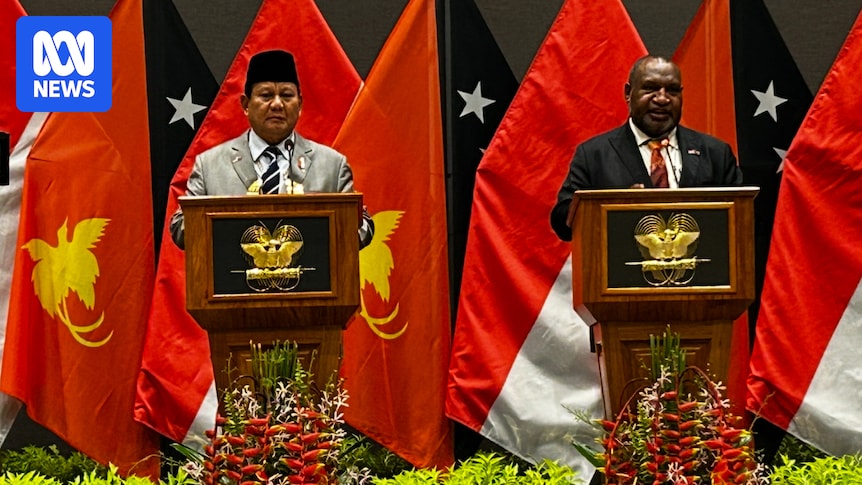
The Indonesian government has issued a statement urging Australia and Papua New Guinea (PNG) to respect its sovereignty following the signing of a landmark defense treaty between the two nations. The treaty, signed in Canberra on Monday, has prompted Indonesia to closely monitor the evolving defense dynamics in the region.
In a statement to the ABC, Indonesia’s Foreign Ministry spokesperson Vahd Nabyl emphasized the country’s expectation that the two nations will “uphold the sovereignty and independence” of Indonesia. “Indonesia respects every country’s right to enhance its defense systems,” Mr. Nabyl stated. “And believes that any such cooperation should contribute to peace and stability in the region, while avoiding the escalation of geopolitical rivalry.”
Historical Context and Regional Implications
The Pukpuk Treaty represents Australia’s first new defense alliance in over 70 years, committing both countries “to meet the common danger, in accordance with [each other’s] constitutional process.” This development has raised questions about the ongoing conflict and tension in West Papua, a region where the struggle for independence from Indonesia has intensified, often with deadly outcomes.
The Indonesia-PNG border has become a focal point of this conflict, with many displaced West Papuans seeking refuge in PNG. Indonesia has responded by tightening border control and deploying troops to suppress the separatist movement. Mr. Nabyl assured that Indonesia maintains “strong cooperation, communication, and coordination” with PNG to ensure security along the border, while reiterating the expectation that Australia and PNG will respect Indonesia’s sovereignty.
Expert Opinions on the Treaty
Natalie Sambhi, a military expert from the think tank Verve Research, shared insights on the potential impact of the treaty on regional dynamics. She expressed confidence that both Indonesian and PNG governments would strive to minimize tensions caused by West Papuan independence fighters crossing the border. “Short of a gross human rights violation, which could trigger a wellspring of anti-Indonesian sentiment among border communities, the status quo will prevail,” she said.
“Of course, future scenarios could arise in which Australia might be compelled to side with PNG,” Dr. Sambhi noted. “Any such decision would have to be weighed against the long history of defense ties with Indonesia, the trust painstakingly built between the two countries, and the long-term consequences of a rupture in relations with Jakarta.”
Responses from Papua New Guinea
Papua New Guinea’s Prime Minister, James Marape, addressed concerns regarding the treaty’s implications for regional stability. Speaking to 7.30 earlier this week, Mr. Marape clarified that the Pukpuk Treaty does not obligate Australia to intervene in the event of a conflict on the Indonesian border. He emphasized PNG’s “healthy dialogue with Indonesia” and expressed confidence that Indonesia would not be offended by the treaty, noting that his government did not consult Indonesia prior to signing.
Indonesia’s Diplomatic Stance
In response to queries about potential similar agreements with other powers, Mr. Nabyl reiterated Indonesia’s commitment to its “free and active” foreign policy, which avoids entering into military or defense alliances. Dr. Sambhi explained that while Indonesia’s ties with China appear robust, particularly in trade and infrastructure, the country continues to rely on traditional partners like the United States and Australia for military cooperation.
“Even though the country has appeared to draw closer to China in the first year of his presidency, Prabowo has been cultivating relations with the UK, Russia, France, India, Canada, the Gulf States and more,” Dr. Sambhi added.
Looking Ahead
As the region navigates these new defense dynamics, Mr. Nabyl emphasized the shared responsibility of all nations to maintain regional security. “We believe PNG and Australia are also aware of this responsibility,” he said. “Indonesia will continue to maintain dialogue with both countries on matters of mutual interest … including in the implementation of defense policies that may affect the region.”
Dr. Sambhi concluded that the Australia-PNG treaty could ultimately benefit Indonesia by ensuring a more capable neighbor equipped to address both traditional and emerging hybrid threats. She highlighted the potential for expanded collaboration in areas such as maritime security, humanitarian assistance, and disaster relief.







